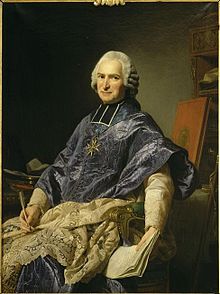Joseph Marie Terray
Joseph Marie Terray ( Abbé Terray ; * 1715 in Boën-sur-Lignon , † 1778 in Paris ) was a priest and French finance minister under Louis XV. from France.
Live and act
The father was Jean Antoine Terray (1662–1727), tax collector in Lyon, married in second marriage since 1705 to the mother Anne Dumas de Matel (* 1661). He came from a respected bourgeois family. His uncle François Terray de Rosières was the personal physician of the Duchess of Orléans, Liselotte von der Pfalz ; he had made a fortune during the speculative bubble triggered by John Law . Together with his brother, the finance judge Pierre Terray, Viscount de Rosières (1713-1780), Joseph Marie Terray inherited him. The two brothers acquired the La Motte-Tilly castle and had today's baroque building erected there from 1755.
After receiving the diaconate Terry in 1736 began as counsel to the Paris Parlement , specializing in financial matters. With the support of Madame Pompadour , he was admitted to court from 1754. In 1764 he was titular abbot of Molesme Abbey , and in 1774 of Saint-Martin Abbey in Troarn , which brought him rich income. Personally, he was known more as a libertine than a devout clergyman.
Terray, who became Minister of Finance (General Controller of Finance) in 1769 thanks to the support of René-Nicolas-Charles-Augustin de Maupeou , Chancellor of King Louis XV , was faced with a catastrophic state of finances. Despite several attempts (e.g. the founding of the Banque Générale by John Law ) , his successor was unable to overcome the national bankruptcy inherited from King Louis XIV , so that the country, as the leading political, military and cultural power on the continent, found itself in a constant payment crisis .
Terray, on behalf of the French state, refused to pay part of the French national debt. These so-called Repudiations, together with renegotiating the lease amounts to be paid by the tax farmers, gave the state greater financial leeway. In addition, he provided the state treasury with additional income by controlling the grain trade. In the political field, he overthrew Foreign Minister Étienne-François de Choiseul in 1770 by showing his plans for a war against Great Britain as priceless. His successes in increasing the state revenue brought with it considerable opposition to himself. Louis XVI therefore dismissed him immediately after taking office.
meaning
Terray formulated the thesis that the eternal duration of the state makes it necessary for it to declare national bankruptcy on all its debts once every 100 years in order to restore its balance sheet (see below, Manes, p. 31). His severity in debt relief was described by 19th century historians as one of the causes of the outbreak of the revolution (see below Gomel, p. 30), and he himself as “a man whose name will be laden with curse and shame over the centuries ; a clergyman of boundless immorality, but a great worker and extremely accomplished orator with decided financial talent ”(see and Niebuhr, p. 134).
Quote
"Your Majesty, I find it - priceless" (When asked by the king how he found the Palace of Versailles and the festivals there.)
swell
- Uwe Schultz: Versailles. The sunny side of France. 2002
- Alfred Manes: National Bankruptcies. Economic and legal considerations. Berlin 1922
- Charles Gomel: Les Causes financières de la Revolution Francaise. 1st volume. Paris 1892
- Markus Niebuhr: History of the Age of Revolution. Hamburg 1845
Individual evidence
| predecessor | Office | successor |
|---|---|---|
| Étienne Mainon d'Invault |
General Controller of Finance December 22, 1769–24. August 1774 |
Anne Robert Jacques Turgot |
| personal data | |
|---|---|
| SURNAME | Terray, Joseph Marie |
| BRIEF DESCRIPTION | Priest and French finance minister under Louis XV. |
| DATE OF BIRTH | 1715 |
| PLACE OF BIRTH | Boën-sur-Lignon |
| DATE OF DEATH | 1778 |
| Place of death | Paris |
